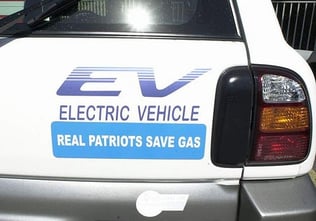 On January 8, 2024, New Jersey Governor Phil Murphy signed the Electric and Hybrid Vehicle Battery Management Act (Senate Bill (SB) 3723, Smith et al.; referred to as “the Act” below)), to create a statewide system to ensure recycling of “propulsion batteries” used for electric vehicles (EVs). This is the first such program in the United States (the European Union includes EV batteries within broader battery management and recycling regulations adopted in June 2023). The Act applies the “producer responsibility” model increasingly used in state laws to require recycling of commercial products and materials (I’ve written about such programs several times, including a general discussion HERE, and discussion of Maine’s program for packaging HERE).
On January 8, 2024, New Jersey Governor Phil Murphy signed the Electric and Hybrid Vehicle Battery Management Act (Senate Bill (SB) 3723, Smith et al.; referred to as “the Act” below)), to create a statewide system to ensure recycling of “propulsion batteries” used for electric vehicles (EVs). This is the first such program in the United States (the European Union includes EV batteries within broader battery management and recycling regulations adopted in June 2023). The Act applies the “producer responsibility” model increasingly used in state laws to require recycling of commercial products and materials (I’ve written about such programs several times, including a general discussion HERE, and discussion of Maine’s program for packaging HERE).
The Act takes effect on January 8, 2025, after which a series of planning, implementation, and compliance deadlines will apply. The remainder of this note discusses this new legislation, which is to be administered by the state Department of Environmental Protection (DEP).
Which parties, batteries and activities does the Act target?
The Act applies to “propulsion batteries,” which it defines as follows:
"Propulsion battery" means an electrical energy storage device, consisting of one or more individual battery modules or battery cells, which are used to supply power to propel an electric or hybrid road vehicle. "Propulsion battery" includes, but is not limited to, lithium-ion batteries and nickel-metal hydride batteries, and includes batteries that have been removed from a vehicle and batteries that are still embedded in a vehicle. "Propulsion battery" does not include a starter battery or a battery used for, or embedded in, products for industrial applications.
Primary requirements apply to “producers,” which include entities that manufacture, remanufacture, or import propulsion batteries into New Jersey. The Act also assigns responsibilities to sellers and recyclers of batters, and to transporters of products and wastes.
What needs assessment is DEP to conduct?
By July 8, 2025 DEP is to begin a “needs assessment” to determine “the availability of authorized propulsion battery recyclers and related infrastructure, both public and private, needed to implement the provisions of this act, in addition to any other necessary information, as identified by the department.” DEP is to complete this needs assessment by July 8, 2026, and submit it to the governor and post it on the agency’s website. Based on its determination of available resources and those yet to develop, DEP is will apply the results of the needs assessment to guide its implementation of the Act.
What requirements will DEP adopt and enforce?
Within 18 months after it completes its needs assessment – nominally January 8, 2028 – DEP is to adopt rules and regulations that clarify and administer propulsion battery management requirements, applying statutory requirements and prohibitions. The Act assigns producers (i.e., manufacturer, remanufacturer, or importer) “producer responsibility” for end-of-life management of batteries, which they may accomplish by take-back of batteries and/or entire vehicles, or by another mechanism approved by DEP. Requirements include at least the following:
- battery management plans
A plan must be submitted to DEP by or for each propulsion battery producer selling in the state. A producer can submit its own plan or join a group plan covering more than one producer. Each plan must include:
- methods to accept and transport the used batteries or complete vehicles offered to the producer, including collection services, and roles for vehicle recyclers and authorized propulsion battery recyclers;
- processes and methods to be utilized to remanufacture, repurpose, or recycle propulsion batteries at the end of their service life, identifying any authorized propulsion battery recyclers and providing a plan for final disposal of such batteries, in accordance with environmentally sound management practices;
- a strategy for informing electric vehicle owners, vehicle repair facilities, and vehicle dismantlers about state requirements for proper battery management, environmental impacts of improper handling or disposal, and mechanisms for battery management available pursuant to the plan;
- means to implement and finance the battery management plan; and
- any other information, policies, or procedures required by DEP
Plans are to use existing recycling infrastructure to the extent possible, and justification where such infrastructure is not used. Plans are to provide for financing of the collection, transportation, remanufacturing, reuse, recycling, or disposal of used batteries. Each producer is required to provide for the management of used propulsion batteries, bearing the associated costs. Existing producers must file plans within 180 days after DEP issues its rules (nominally by mid-2028), and producers entering the state market after DEP’s rules must submit a plan before they begin producer activities.
DEP is to approve or disapprove each plan within 180 days. Producers have 90 days to implement approved plans; the Act provides procedures and timelines for responding to disapproved plans.
- labeling requirements
Beginning January 1, 2027, every propulsion battery sold in New Jersey, whether or not embedded in a vehicle, must include a permanent label providing information about the battery. This label must conform to provisions of the California Low Emission Vehicle (LEV) program. Any person who remanufactures or repurposes a propulsion battery must relabel it pursuant to the labeling standard to be adopted by DEP, before selling, importing, or distributing it for use in the State. DEP is to adopt implementing regulations.
- take-back provisions
Once the program is operating, a person seeking to discard a propulsion battery may deliver the battery or the vehicle that contains it, or meet other procedures from the producer’s plan, to one of the following:
- a location designated by the battery producer in its battery management plan;
- a DEP-authorized vehicle recycler that adheres to the battery management plan for that propulsion battery; or
- an authorized propulsion battery recycler, provided that the recycler’s employees undergo mandatory safety training to ensure the proper management and recycling of such batteries (DEP may prescribe training requirements, or approve requirements set forth in a plan).
A producer cannot refuse to accept one of its batteries offered in conformity to its plan.
- disposal restrictions
Effective January 8, 2028 the Act prohibits disposal of any propulsion battery, or a battery module or battery cell from such a battery, unless authorized by DEP. As of that date, no state-licensed solid waste collector can knowingly collect a propulsion battery, module or cell for disposal, unless permissible under DEP’s regulations. As of the same date, no solid waste disposal facility can receive for disposal any propulsion battery/module/cell, or any shipment (truckload or roll-off container) of solid waste containing them, unless permissible under DEP’s regulations.
- additional administrative requirements
The Act also includes additional administrative and enforcement requirements, including:
- producers must provide consumers with educational materials related to their approved battery management plans, and available collection services. The educational materials must include, at least, information identifying the end-of-life management options available through their battery management plan, and a notice that in New Jersey the costs of the services will be covered by the producer.
- producers are to register with DEP by January 8, 2026
- beginning January 8, 2027, producers are to submit annual reports on numbers of propulsion batteries sold or offered in New Jersey, on a form to be developed by DEP
- violations of this Act constitute violations of New Jersey’s Solid Waste Management Act. DEP is to develop consumer complaint procedures, and develop and provide educational materials
What happens next?
DEP should be organizing to conduct the required needs assessment, and entities that produce or manage “propulsion batteries” should be preparing for compliance requirements. Although specific compliance requirements will not appear until DEP completes its regulations, you can anticipate that battery management plans and take-back programs will be similar to those being adopted for other products through extended producer responsibility (EPR) programs (which I discussed in the blogs referenced above). Similar programs are likely to emerge fairly soon in other states, perhaps as expansions of recycling and EPR programs already applicable to other types of batteries.
Self-assessment checklist
Does the organization produce and/or sell batteries for use in vehicles?
- If so, has the organization evaluated management options for post-use batteries?
- Has the organization assumed any post-use responsibilities for such wastes?
Does the organization use electric or hybrid fuel-electric vehicles?
- If so, has the organization established procedures for managing batteries at the end of their useful lives?
Does the organization perform any of these activities in New Jersey?
Does the organization track legislative and regulatory processes in order to stay informed about possible changes in applicable waste management requirements, including the New Jersey act and other possible EPR/stewardship mandates?
Where can I go for more information?
- New Jersey, “Electric and Hybrid Vehicle Battery Management Act” (SB 3723; Public Law 2023-222)
- Council of Europe, “Regulation of the European Parliament and of the Council concerning batteries and waste batteries, amending Directive 2008/98/EC and Regulation (EU) 2019/1020 and repealing Directive 2006/66/EC” (6/29/23)
- California Air Resource Board (ARB) –
- low emission vehicle (LEV) program webpage
- zero emission vehicle (ZEV) program webpage
About the Author
 Jon Elliott is President of Touchstone Environmental and has been a major contributor to STP’s product range for over 30 years.
Jon Elliott is President of Touchstone Environmental and has been a major contributor to STP’s product range for over 30 years.
Mr. Elliott has a diverse educational background. In addition to his Juris Doctor (University of California, Boalt Hall School of Law, 1981), he holds a Master of Public Policy (Goldman School of Public Policy [GSPP], UC Berkeley, 1980), and a Bachelor of Science in Mechanical Engineering (Princeton University, 1977).
Mr. Elliott is active in professional and community organizations. In addition, he is a past chairman of the Board of Directors of the GSPP Alumni Association, and past member of the Executive Committee of the State Bar of California's Environmental Law Section (including past chair of its Legislative Committee).
You may contact Mr. Elliott directly at: tei@ix.netcom.com
